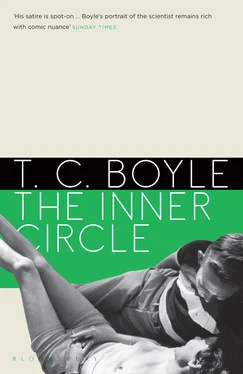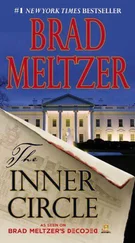“But this is great news! To have you married, Milk — don’t you see what this will do for the project? You won’t be — and you’ll forgive me — so wet behind the ears, or appear to be, at any rate. A married man conducting interviews has got to inspire more confidence, especially in older subjects, and females, of course, than a bachelor. Don’t you think?”
And here I could answer him with confidence even as the image of Mrs. Foshay fought to crowd everything else out of my brain. “That goes without saying, Prok, and I have been listening, believe me, on all those occasions when you kept wishing I was older and more, well, experienced—”
“Good, good,” he said, “good,” and he’d turned to go back to his desk when he swung round on me with an afterthought. “Iris,” he said. “Do we have her history?”
Over the course of the next two months, Prok was in increasing demand as a lecturer, and we began, of necessity, to step up our travel schedule. Word had gotten around. It seemed that every civic group, private school and university in a five-hundred-mile radius wanted him to appear, and at this stage, Prok never turned down an invitation. Nor did he charge a fee, even going so far as to pay traveling expenses out of his own pocket, though his first fledgling grants from the National Research Council and the Rockefeller Foundation helped cover him here — as they did with my salary as his first full-time employee. The routine was the same as always — Prok would find himself in a hall somewhere, the crowd already gathered, and he would lecture with his usual frankness on previously taboo subjects and then ask for volunteers — friends of the research, he’d begun to call them — to step forward and have their histories taken. When we weren’t in his office, working out our tabulations, curves and correlation charts, we were off on the road, collecting data, because, as Prok said, over and over, you could never have enough data.
And how did I feel about all this? I was excited, of course, and I was infused with Prok’s enthusiasm — I believed in the project with every ounce of my being, and I still do — but the timing was a bit awkward, as you can imagine. Iris and I had just become engaged. We treasured each other’s company. We’d begun to enjoy each other sexually (though both of us were still fighting our inhibitions and it wasn’t at all the same as it was with Mac). I wanted to be with her, to stroll arm in arm round Bloomington and poke through the secondhand shops, looking for dishware, rugs and the like, pricing furniture for the household we hoped to set up come June — and we needed to find an apartment we could afford within our limited means, and that was going to take some time and footwork too. But instead I was sitting up in second-rate hotels till one and two in the morning, utterly exhausted, trying to squeeze as many histories as possible into each working day. I was drinking and smoking too much. My ears rang, my head ached, my eyes felt molten, and nothing, not even the details of the most arcane sexual practices, could arouse me from my torpor — not coprophilia, incest or sex with barnyard animals. I just nodded, held the subject’s eyes, and made my notations on the position sheet.
We must have collected some two hundred histories during this period, really driving ourselves, but thus far the research was skewed by the fact that the majority of our histories were predominantly upper-level — that is, from college students and professionals. We’d begun to branch out, as I’ve mentioned, and we did make trips to collect histories among the denizens of the homosexual underground in Indianapolis and Chicago, as well as at least one prison and the state work farm where Prok had made so many of his most valuable contacts — and one contact invariably gave rise to another, and another, ad infinitum, so that now we were determined to pursue as many of these lower-level histories as we could. What we lacked above all were black histories, and so we decided to mount a second expedition to Gary, Indiana, and the aforementioned Negro neighborhood there.
We left Bloomington on a drizzly Saturday morning in mid-April (we were still working around Prok’s teaching schedule then — though the marriage course was dead, he was nonetheless committed to his biology classes, one of which met at eight o’clock on Saturday mornings, a cruel hour for any undergraduate to have to bend over a dissecting pan or distinguish between mono- and dicotyledons). We drove straight through, going as fast as the roads, the Nash and the state police would abide, arriving just after dark. We had an indifferent meal at a poorly lit diner, and sat there over coffee and pie as the drizzle solidified into a gray intermittent rain that wasn’t going to make our work — outdoor work, on the streets — any easier. Prok looked grim. He kept checking his watch, as if that could somehow stop the rain and accelerate the coming of the hour at which we were to meet our contact. He had good reason to be anxious. Our first expedition to Gary, in the deep-freeze of February, had been a failure. We’d spent endless hours circling one block after another, peering hopefully through the windshield any time a figure appeared on the deserted streets, but Prok’s contact failed to show up, and we didn’t get a single history. Neither of us mentioned it now. We just finished our coffee, shrugged into our rain gear and climbed back into the car, heading six blocks south, into the Negro neighborhood.
Prok parked on a side street around the corner from a bar called Shorty’s Paradise, in a neighborhood of modest storefronts (HAIR-DRESSER, SANDWICHES MADE TO ORDER, BUTCHER SHOP) with walkup apartments above them and the smokestacks of the factories looming up in the near distance like the battlements of a degraded castle. The street was littered with sodden newspaper, bottles, discarded food wrappers. Rain streaked the windshield and painted a sheen of reflected light on the pavement. There was no sign of life. We got out of the car and the doors slammed behind us like a cannonade.
My first surprise came when we turned the corner — the street outside Shorty’s Paradise was thronged with people despite the rain, a whole mob spilling from the open door of the saloon and fanning out in both directions under the tattered awning. But these were black people, exclusively black, and I have to confess that I’d never to this point had much contact with Negroes, aside from the occasional pleasantry—“Nice day, isn’t it?”—I exchanged with the odd maid or cook who came into the market where I’d worked summers. There was music drifting out the open door, a gaggle of voices, the smell of tobacco, marijuana, alcohol. I didn’t know what to do. I hesitated.
But Prok. Prok was the second surprise. Though he detested bars, cigarettes and, especially, what he termed the “jungle beat” of popular music, he strode right past the crowd and though the front door as if he’d been going there every Saturday night of his life. He was dressed, as always, in his dark suit, white shirt and bow tie, over which he’d casually slung a yellow rain slicker that seemed always to hitch up in back as if it had been sewn together from two mismatching bolts of oilcloth. I was dressed in a dark suit and tie as well, though my overcoat — a thing my grandmother had picked out for me — was gray with black flecks and hung to my ankles. I could feel the hair prickling under the band of my hat, ready to spring loose the minute I stepped inside. I ducked my head and followed Prok through the door.
A long, trailing mahogany-topped bar dominated the place, and it was packed shoulder-to-shoulder with chattering people, all of whom glanced up as we stepped through the door, then turned away as if they hadn’t seen us at all. The jukebox was playing “Minnie the Moocher” at a dynamic volume and everyone in the place seemed to be shouting to be heard above it. Prok went straight to the bar, elbowed his way in and immediately started up a conversation with a towering man in an electric-blue double-breasted suit. And this was the third thing, the oddest of all: Prok began to speak in dialect. I was stunned. As you may know, Prok was a real stickler for standard English, and he wasn’t at all shy about correcting grammatical mistakes — he could be brutally sarcastic about it too — but here he was, switching to the vernacular like a ventriloquist. The conversation went something like this:
Читать дальше












